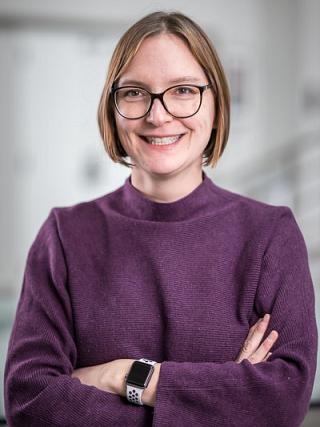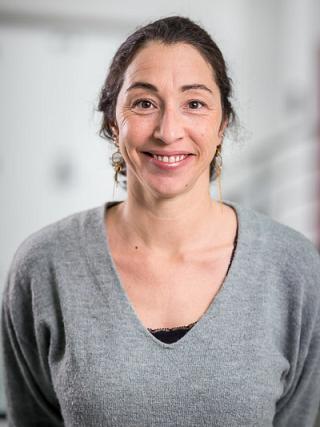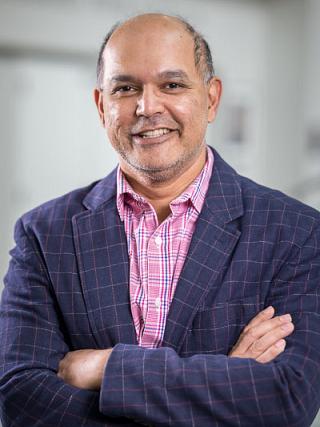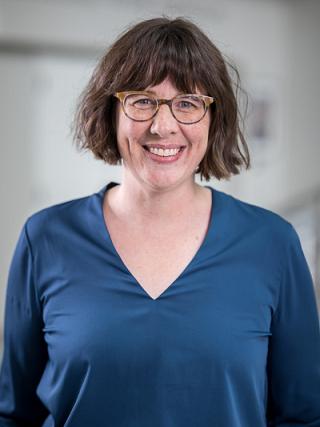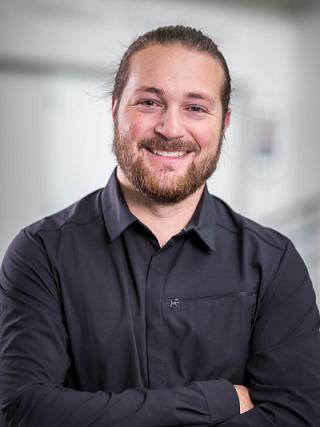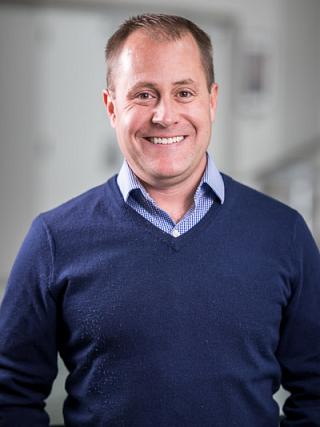
Vitae 2022, a hallmark event recognizing research excellence across University of Utah Health, featured six rising-star faculty who are on the forefront of their professions. The annual symposium, presented by Vice Chair for Faculty Affairs and Development Michael Rubin, MD, PhD, on behalf of the Office of the Senior Vice President for Health Sciences Research Unit, allows researchers to share stories of their science, and how they got to where they are today, in a compelling way to a hybrid live and online audience.
Allison Carey, MD, PhD Assistant Professor, Department of Pathology Medical Director, ARUP Laboratories
Cracking The Code: Deciphering The Impact of Genetic
Variation In Mycobacteria
Personal Statement: The pathogen Mycobacterium tuberculosis and related mycobacteria infect tens of millions of people every year, resulting in well over a million deaths. This group of pathogens causes chronic and treatment-resistant infections that require months to years of antibiotic therapy to achieve cure, with high rates of treatment failure. The mechanisms these bugs use to establish long-term infections and resist even sustained antibiotic treatment are poorly understood. Much work in the field has focused on a tiny number of laboratory-adapted “reference” isolates of these pathogens. This limits understanding of the bacterial features that drive infection and treatment outcomes. My research seeks to decipher how real-world mycobacteria are evolving in response to clinical interventions, including antibiotics and vaccination. To do so, my team uses a variety of advanced genetic and genomic and techniques to study large collections of bacterial strains isolated from patients. In the long-term, we believe our discoveries will inform the development of improved antibiotics, diagnostic and prognostic tools, and vaccines for this challenging group of pathogens.
Research Ambitions: I want to understand how genetic plasticity in mycobacteria drives antibiotic resistance, virulence, and vaccine escape, with the goal of improving diagnostics and therapeutics for these challenging infections.
Watch the video below and share from YouTube.
Amandine Chaix, PhD Assistant Professor, Department of Nutrition and Integrative Physiology, College of Health
Harnessing Nutrition and the Circadian Clock to Improve
Metabolic Health
Personal Statement: Too many calories ingested—and/or too few expended— accumulate as fat and lead to weight gain. Being overweight or with obesity increases risks of co-morbidities, such as cancer and cardiometabolic diseases. These conditions dramatically affect health and well-being. They also burden our economy and health care systems. Many factors—genetics, social determinants, physical and eating habits—contribute to obesity. Beyond nutritional quality, research has shown that nutritional timing may impact nutritional balance. This is relevant because easy, round-the-clock access to energy-dense foods, long daily eating windows, and short fasting intervals are culturally ubiquitous features of our 24/7 societies. These habits conflict with the body’s circadian clock and may lead to poor cardiometabolic health. Reciprocally, we have shown that bolstering clock’s function with time-restricted feeding (TRF), an intervention that limits daily caloric intake to an eight to ten-hour daily window, can prevent weight gain and ameliorate metabolic dysfunctions. TRF benefits extend to a variety of disease conditions improving health throughout the lifespan. Our studies have set the ground to investigate the benefits of TRF in humans with currently over 100 ongoing clinical trials worldwide. Obesity statistics are alarming and warrant continued research to reveal the physiology, energetics, and molecular mechanisms driving body weight changes.
Research Ambitions: We aim to elucidate the molecular determinants of body weight control and metabolic balance to develop new therapeutics to manage obesity and associated metabolic dysfunctions.
Watch the video below and share from YouTube.
Dipayan Chaudhuri, MD, PhD Assistant Professor, Department of Internal Medicine Principal Investigator, Nora Eccles Harrison Cardiovascular Research and Training Institute
Repairing a Broken Engine: New Approaches to Treat Heart Failure
Personal Statement: Heart failure happens when this organ is unable to pump sufficient blood with each heartbeat. It occurs due to various conditions, such as heart attacks, diabetes, or high blood pressure. Current treatments focus on relieving excess stress on the heart. These have only partially lengthened lifespan and improved symptoms of people with this disease. We desperately need therapies that target the fundamental problem seen in most forms of heart failure: an inability to supply the heart with sufficient energy for the work it does. Within each heart cell, mitochondria act as energy factories, processing what we consume into fuel the heart muscle can use. Dysfunctional mitochondria are a critical and common barrier found across the spectrum of heart failure. They’re also the main target for study within my lab. Our efforts focus on forms of heart failure that occur in infants born with mitochondrial cardiomyopathies, or mutations in their mitochondria. Studying animal and cellular models of these diseases, we have recently identified a mechanism by which cardiac cells themselves try to compensate for mitochondrial dysfunction. We hope to find compounds that boost this pathway, and thus create a novel therapy to treat heart failure.
Research Ambitions: We seek new therapies to treat mitochondrial dysfunction in heart failure.
Watch the video below and share from YouTube.
Jacqueline Eaton, PhD Assistant Professor, College of Nursing
Arts-Based Approaches for Engaging Caregivers of People
Living with Dementia
Personal Statement: By 2050, an estimated 13.8 million Americans will be living with dementia. Up to 90% of them will have behavioral symptoms, such as agitation, combativeness, and depression. These behaviors heighten stress and lead to negative outcomes, such as poor health, depression, and increased burden for caregivers. Actively engaging caregivers in training improves outcomes for them. Unfortunately, optimization and systematic testing of active engagement techniques is lacking. Arts-based approaches to engaging caregivers have the potential to enhance training through multisensory detail and increased preparation as a result of practice. My research seeks to develop and test arts-based techniques to enhance active caregiver training and to prepare caregivers to better manage behavioral symptoms of dementia.
Research Ambitions: I want to improve the lives of older adults and their caregivers through arts-based interventions.
Watch the video below and share from YouTube.
Jacob A. George, PhD Assistant Professor, Department of Physical Medicine & Rehabilitation Assistant Professor, Department of Electrical & Computer Engineering
Brain-Computer Interfaces for Individuals With Life-Altering Neuromuscular Disabilities
Personal Statement: Our hands represent a large part of what we can do and who we are. For individuals suffering from limb loss or paralysis, loss of hand function often results in physical disability and non-autonomy. This can lead to potential loss of employment, anxiety, and depression. Assistive technologies—prosthetic hands, robotic exoskeletons, and smart-home devices—have the potential to drastically increase patients’ independence and quality of life. Unfortunately, methods for controlling these assistive technologies remain primitive. At the Utah NeuroRobotics Lab, we use electrical interfaces with the arm nerves and muscles to create a bidirectional link to an individual’s nervous system. Using this brain-computer-interface technology, we developed a dexterous prosthetic arm intuitively controlled by thought and endowed with a natural sense of touch. We are extending this technology to smart-home devices to create an inclusive world in which all individuals, regardless of physical ability, can seamlessly interact with their environment simply by thought.
Research Ambitions: Our research seeks to augment biological neural networks with artificial neural networks and bionic devices to treat neurological disorders and further our understanding of neural processing.
Watch the video below and share from YouTube.
Matthew Miller, PhD Assistant Professor, Department of Biochemistry
Understanding the Remarkable Protein Machines
That Drive Cell Division
Personal Statement: Cells in the human body will divide some 10,000 trillion times over a person’s lifetime. During each round of cell division, the genetic information carried on chromosomes must be accurately partitioned to the two daughter cells. Accurate segregation of chromosomes during cell division is critical. Errors in the process are the leading cause of miscarriages and congenital birth defects. They are also the most prevalent genetic alteration in tumor cells. Despite this, we know very little about why chromosome segregation is so defective in these circumstances. A key player in chromosome segregation is the kinetochore. This protein complex attaches chromosomes to the spindle that will pull them into the daughter cells. It actively monitors to ensure chromosomes remain attached correctly. Using an array of cutting-edge tools, our lab investigates the mechanisms that allow duplicated chromosomes to be accurately distributed when a cell divides. This work could lead to novel strategies for reducing chromosomal segregation defects that give rise to many human diseases, including cancer, and developmental disorders like Down syndrome.
Research Ambitions: Our research focuses on how dividing cells ensure that each resulting daughter cell inherits a copy of every chromosome. We take an interdisciplinary approach that combines protein biochemistry, yeast genetics, cell biology, and biophysical approaches to understand the macromolecular machines that carry out this process.
Watch the video below and share from YouTube.
Beyond Medicine: The Science of Resilience
When treating patients who have had their lives upended by stroke, there are limits to what medicine can do, says U of U Health neurologist and Clinical & Translational Science Institute co-director Jennifer Majersik, MD. That’s where her interest in stroke research at all stages—from laboratory science to rehabilitation—is making a difference. With College of Health behavioral psychologist Alexandra Terrill, PhD, these two scientists are combining their expertise to develop one-of-a-kind interventions that promote resilience and are changing lives for stroke patients, and their loved ones, for the better.

